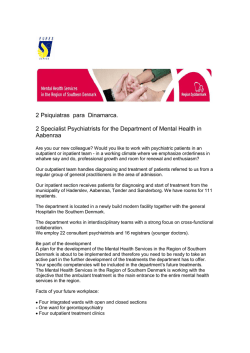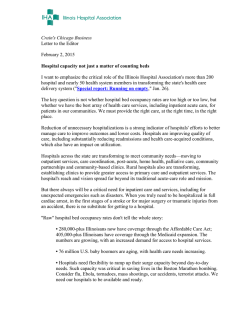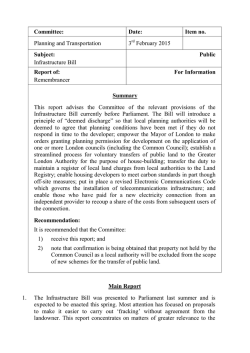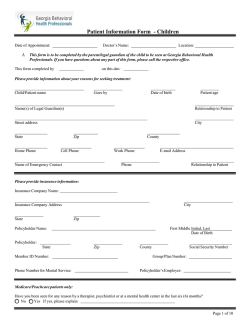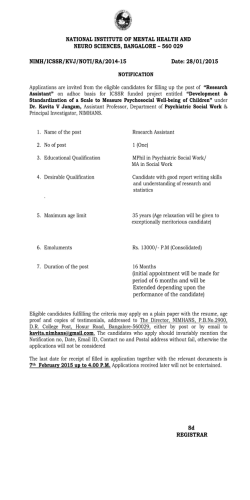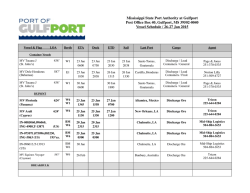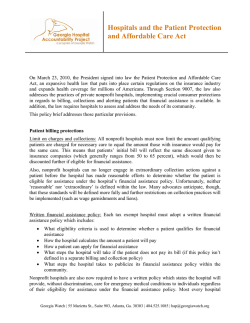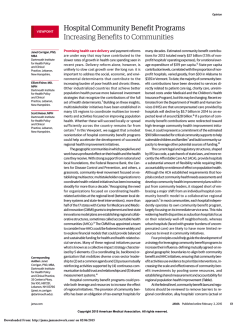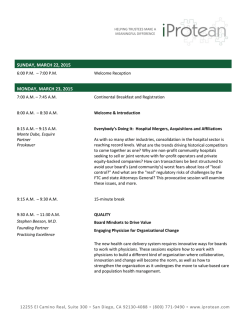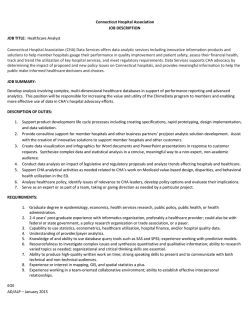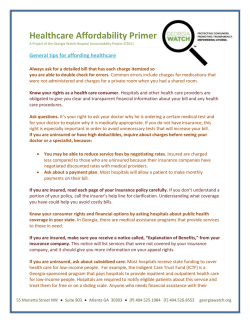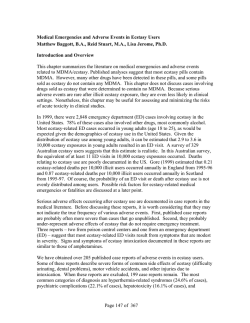
Standards Revisions for Psychiatric Hospitals
• Issued December 16, 2014 • Prepublication Requirements The Joint Commission has approved the following revisions for prepublication. While revised requirements are published in the semiannual updates to the print manuals (as well as in the online E-dition®), accredited organizations and paid subscribers can also view them in the monthly periodical The Joint Commission Perspectives®. To begin your subscription, call 800-746-6578 or visit http://www.jcrinc.com. Standards Revisions for Psychiatric Hospitals APPLICABLE TO PSYCHIATRIC HOSPITALS Note: The therapeutic activities program is appropriate to the needs and interests of patients and is directed toward restoring and maintaining optimal levels of physical and psychosocial functioning. Effective February 1, 2015 Leadership (LD) Provision of Care, Treatment, and Services (PC) Standard LD.04.03.01 The hospital provides services that meet patient needs. Elements of Performance for LD.04.03.01 A 1. The needs of the population(s) served guide decisions about which services will be provided directly or through referral, consultation, contractual arrangements, or other agreements. Note: For psychiatric hospitals that use Joint Commission accreditation for deemed status purposes: If medical and surgical diagnostic and treatment services are not available within the hospital, the hospital has an agreement with an outside source for these services to make sure that the services are immediately available or an agreement needs to be established for transferring patients to a general hospital that participates in the Medicare program. A 14. For psychiatric hospitals that use Joint Commission accreditation for deemed status purposes: The psychiatric hospital provides psychological services, social work services, psychiatric nursing, and therapeutic activities. Key: A indicates scoring category A; C indicates scoring category C; indicates an Immediate Threat to Health or Safety; Standard PC.01.02.13 The hospital assesses the needs of patients who receive treatment for emotional and behavioral disorders. Elements of Performance for PC.01.02.13 A 2. Patients who receive treatment for emotional and behavioral disorders receive an assessment that includes the following: • Current mental, emotional, and behavioral functioning • Maladaptive or other behaviors that create a risk to the patient or others • Mental status examination • For psychiatric hospitals that use Joint Commission accreditation for deemed status purposes: Reason for admission as stated by the patient and/or others significantly involved in the patient’s care • For psychiatric hospitals that use Joint Commission accreditation for deemed status indicates that documentation is required; indicates situational decision rules apply; indicates Measure of Success is needed; indicates direct impact requirements apply; indicates an identified risk area Copyright 2014 The Joint Commission 1 Prepublication Requirements continued December 16, 2014 purposes: Onset of the patient’s illness and circumstances leading to admission • For psychiatric hospitals that use Joint Commission accreditation for deemed status purposes: Inventory of the patient’s strengths and disabilities (such as psychiatric, biopsychosocial problems requiring treatment/intervention) written in a descriptive manner on which to base a treatment plan (See also PC.01.03.01, EP 1) C 5. Based on the patient’s age and needs, the assessment for patients who receive treatment for emotional and behavioral disorders includes the following: • The patient's family circumstances, including the composition of the family group • The community resources currently used by the patient • The need for the family members' participation in the patient’s care • For psychiatric hospitals that use Joint Commission accreditation for deemed status purposes: A social history and reports of interviews with patients, family members, and others C 6. Based on the patient’s age and needs, the assessment for patients who receive treatment for emotional and behavioral disorders includes the following: • A psychiatric evaluation • Psychological assessments, including intellectual, projective, neuropsychological, and personality testing • For psychiatric hospitals that use Joint Commission accreditation for deemed status purposes: Complete neurological examination at the time of the admission physical examination, when indicated (For more information on physical examination, see PC.01.02.03, EP 4) C 6. For psychiatric hospitals that use Joint Commission accreditation for deemed status purposes: The written plan of care includes the following: • A substantiated diagnosis (The substantiated diagnosis is the diagnosis identified by the treatment team to be the primary focus upon which treatment planning will be based. It evolves from the synthesis of data from various disciplines. The substantiated diagnosis may be the same as the initial diagnosis or it may differ, based on new information and assessment.) • Documentation to justify the diagnosis and the treatment and rehabilitation activities carried out • Documentation that demonstrates all active therapeutic efforts are included Record of Care, Treatment, and Services (RC) Standard RC.02.01.01 The medical record contains information that reflects the patient's care, treatment, and services. Elements of Performance for RC.02.01.01 C 2. The medical record contains the following clinical information: • The reason(s) for admission for care, treatment, and services • The patient’s initial diagnosis, diagnostic impression(s), or condition(s) • Any findings of assessments and reassessments (See also PC.01.02.01, EPs 1 and 4; PC.03.01.03, EPs 1 and 8) • Any allergies to food • Any allergies to medications • Any conclusions or impressions drawn from the patient’s medical history and physical examination • Any diagnoses or conditions established during the patient’s course of care, treatment, and services (including complications and hospital-acquired infections). For psychiatric hospitals using Joint Commission accreditation for deemed status purposes: The diagnosis includes intercurrent diseases (diseases that occur during the course of another disease; for example, a patient with AIDS may develop an intercurrent bout of pneumonia) and the psychiatric diagnoses. • Any consultation reports • Any observations relevant to care, treatment, and services Standard PC.01.03.01 The hospital plans the patient’s care. Elements of Performance for PC.01.03.01 C 1. The hospital plans the patient’s care, treatment, and services based on needs identified by the patient’s assessment, reassessment, and results of diagnostic testing. (See also RC.02.01.01, EP 2 and PC.01.02.13, EP 2) Copyright 2014 The Joint Commission 2 Prepublication Requirements continued December 16, 2014 • The patient’s response to care, treatment, and services • The procedures performed • The care, treatment, and services provided • Any emergency care, treatment, and services provided to the patient before his or her arrival • The patient’s condition and disposition at discharge • • Information provided to the patient and family Any progress notes • • Provisions for follow-up care All orders • Any medications ordered or prescribed • Any medications administered, including the strength, dose, and route • Any access site for medication, administration devices used, and rate of administration • Any adverse drug reactions • Treatment goals, plan of care, and revisions to the plan of care (See also PC.01.03.01, EPs 1 and 23) • Results of diagnostic and therapeutic tests and procedures • Any medications dispensed or prescribed on discharge • Discharge diagnosis • Discharge plan and discharge planning evaluation (See also PC.01.02.03, EPs 6-8) C 10. For psychiatric hospitals that use Joint Commission accreditation for deemed status purposes: Progress notes are recorded by the following individuals involved in the active treatment of the patient: • The doctor of medicine or osteopathy responsible for the care of the inpatient • A nurse • A social worker • Others involved in active treatment modalities Note 1: A discharge summary is not required when a patient is seen for minor problems or interventions, as defined by the medical staff. In this instance, a final progress note may be substituted for the discharge summary provided the note contains the outcome of hospitalization, disposition of the case, and provisions for follow-up care. Note 2: When a patient is transferred to a different level of care within the hospital, and caregivers change, a transfer summary may be substituted for the discharge summary. If the caregivers do not change, a progress note may be used. Note 3: For psychiatric hospitals that use Joint Commission accreditation for deemed status purposes: The record of each patient discharged needs to include a discharge summary with the above information. The exceptions in Notes 1 and 2 are not applicable. All patients discharged need to have a discharge summary. The above individuals record progress notes at least weekly for the first two months of a patient’s stay and at least monthly thereafter. The progress notes include recommendations for revisions in the plan of care as indicated, as well as a precise assessment of the patient’s progress in accordance with the original or revised plan of care. Standard RC.02.04.01 The hospital documents the patient’s discharge information. Element of Performance for RC.02.04.01 C 3. In order to provide information to other caregivers and facilitate the patient’s continuity of care, the medical record contains a concise discharge summary that includes the following: • The reason for hospitalization Copyright 2014 The Joint Commission 3
© Copyright 2026
